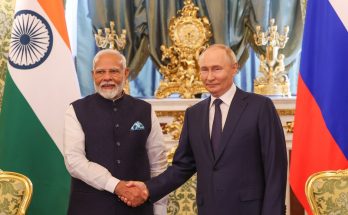 More than two months after the Chinese troops’ incursion into Ladakh stressed India-China ties, the two Asian powers have renewed their efforts to spur a lasting solution to the decade-old boundary dispute. They are trying to firm up a sturdier cross-border mechanism to prevent such incidents from vitiating their ties.
More than two months after the Chinese troops’ incursion into Ladakh stressed India-China ties, the two Asian powers have renewed their efforts to spur a lasting solution to the decade-old boundary dispute. They are trying to firm up a sturdier cross-border mechanism to prevent such incidents from vitiating their ties.
India’s National Security Adviser, Shivshankar Menon and China’s State Councillor, Yang Jiechi, also the designated special representative for boundary negotiations launched the 16th round of talks in Beijing on June 28th. The aim was to impart a fresh momentum to the arduous process of forging a final settlement on the undefined frontier, which is widely seen as the fount of their off-and-on tensions.
The 16th round of SR talks have an added significance, as this is the first boundary-focused dialogue since Beijing’s new leadership took in-charge in March. Bolstering cross-border confidence, building measures along the Line of Actual Control and upgrading the mechanisms designed to resolve incursion-related incidents tops the agenda. The much-publicised border stand-off in Ladakh, ahead of Premier Li Keqiang’s visit to New Delhi, forms the backdrop of the latest round of talks. In their meeting in New Delhi, Indian Prime Minister Manmohan Singh and Chinese Premier Li had prioritised fast-tracking resolution of the boundary question and maintaining peace and tranquillity along the undemarcated frontier as core focus areas in shepherding the sensitive India-China relationship.
Acutely aware of negative commentaries and reports that flooded the Indian media and the public mindspace following the Ladakh incursion, China’s top leadership is also not ready to take chances and is keen to avoid such incidents in the future.
Against this backdrop, China’s new Special Representative Yang, former foreign minister, has struck an optimistic note, saying Beijing was ready to “break new ground” with India on the long-standing border negotiations.
‘Breaking New Ground’
The visit in May by Premier Li Keqiang to New Delhi had “injected fresh and strong momentum” into the relationship, he said in Beijing before sitting down with his Indian counterpart for talks. “The two Special Representatives have a lofty mission and heavy responsibilities,” he said.
“I stand ready to work with you to build on the work of our predecessors and break new ground, to strive for the settlement of the China-India boundary question and to make greater progress in the China-India strategic and cooperative partnership in the new period,” he added.
The warmth and bonhomie was reciprocal. Describing Yang as “an old friend,” Menon said both countries were meeting “at a moment when India-China relations have achieved a momentum and are moving in the right direction”. “It is our conviction that we are at a moment of strategic opportunity for this relationship,” Menon, a Mandarin-speaking former ambassador to China, said.
Setting the tone
The 16th round of boundary talks are expected to set the tone for Stage two of negotiations, during which both sides will seek to establish a framework for delineating the boundary. This will in turn lead to Stage three, the final step that will involve the actual demarcation of over 4,000-km boundary across a vast inhospitable terrain in the Himalayas. Stage three may entail give-and-take and an exchange of physical territory – the most difficult part of the boundary negotiations as ceding even a small piece of territory could be politically risky and whip up nationalistic fervour in both countries.
Since Premier Li’s visit, the messaging from Beijing about India-China relations has been strenuously positive; the powers in Beijing are prickly about the formulaic descriptions of India and China as rivals and want this impression to be reversed or at least balanced by recognition of positive aspects of bilateral cooperation across a swathe of areas, along with trade and investment.
In an interview to The Hindu, an Indian daily, People’s Liberation Army Major, General Luo Yuan, a top Chinese military strategist known for his hawkish views, underlined that China did not want to see “unexpected” incidents along the border with India. What General Luo had to say about Beijing’s views of ties with New Delhi and the boundary dispute should be scrutinised carefully by Indians. General Lou stressed, that he did not see the boundary dispute with India as figuring among China’s top five current military threats. In his assessment, the top threats included the East China Sea, where China is sparring with Japan over the Diaoyu or Senkaku islands; the South China Sea, whose waters and islands are claimed by several countries; and emerging financial, cyberspace and “outer space” threats.
Author Profile
- India Writes Network (www.indiawrites.org) is an emerging think tank and a media-publishing company focused on international affairs & the India Story. Centre for Global India Insights is the research arm of India Writes Network. To subscribe to India and the World, write to editor@indiawrites.org. A venture of TGII Media Private Limited, a leading media, publishing and consultancy company, IWN has carved a niche for balanced and exhaustive reporting and analysis of international affairs. Eminent personalities, politicians, diplomats, authors, strategy gurus and news-makers have contributed to India Writes Network, as also “India and the World,” a magazine focused on global affairs.
Latest entries
 In ConversationJuly 26, 2024India-Italy defence collaboration can extend to third countries: Anil Wadhwa
In ConversationJuly 26, 2024India-Italy defence collaboration can extend to third countries: Anil Wadhwa In ConversationJuly 23, 2024Italy views India as a key partner in Indo-Pacific: Vani Rao
In ConversationJuly 23, 2024Italy views India as a key partner in Indo-Pacific: Vani Rao DiplomacyJune 29, 2024First BRICS unveils a roadmap for boosting tourism among emerging economies
DiplomacyJune 29, 2024First BRICS unveils a roadmap for boosting tourism among emerging economies India and the WorldJune 11, 2024On Day 1, Jaishankar focuses on resolving standoff with China
India and the WorldJune 11, 2024On Day 1, Jaishankar focuses on resolving standoff with China






